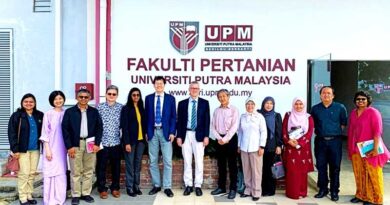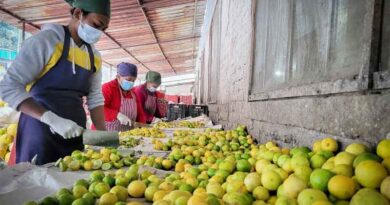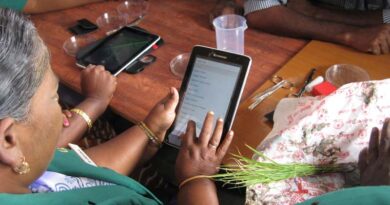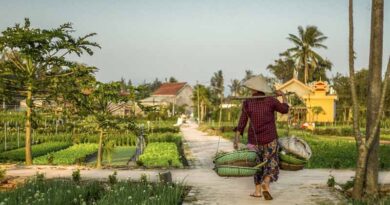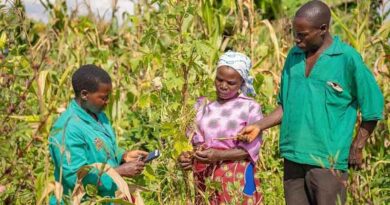CABI participates in WTO panel discussion on challenges and opportunities for smallholder farmers in in international trade
17 July 2023, Africa: CABI has shared its expertise in agriculture value chain development and market access as part of a panel discussion highlighting smallholder farmers facilitation in international trade organised by the World Trade Organisation (WTO) Informal Working Group on Micro, Small and Medium-sized Enterprises (MSMEs). The event was held to celebrate MSME Day 2023.
Dr Muhammad Faheem, ICM Advisor, based at CABI’s regional centre in Malaysia, took part in the event as one of the panellists introducing the CABI-implemented Safer Spices – STDF project in Cambodia, Lao PDR and Vietnam, and also highlighted CABI’s experience of supporting smallholder farmers all along the food value chain.
He joined a range of experts including those from The Food and Agriculture Organization of the United Nations (FAO), the Ministry of Agrarian Development and Family Agriculture of Brazil, and the Avoport – a South African supply chain integrator.
In 2021, the Safer Spices project established an office in Vietnam to help support its work to secure market access through improved food safety within the peppercorn value chain. The project aims to achieve this by improving compliance with food safety requirements in high-value markets such as Europe, the USA and Japan.
Challenges smallholder farmers face
The experts, who met online, discussed the challenges smallholder farmers face to access first buyers and global markets; adhere to standards; and navigate the inherent risks and costs. They also talked about what has worked and what more can be done to support these businesses through access to information, infrastructure and logistics.
Smallholder farmers are an important MSMEs, especially in developing economies where roughly 9% of MSMEs are in the agriculture sector (WTO World Trade Report, 2016). These farmers contribute significantly to the global economy and often represent the first link in complex, time-sensitive, food supply chains.
However, many smallholder farmers face a range of issues that hold them back from joining international markets. These include having to comply with strict international standards for Sanitary and Phytosanitary (SPS) requirements at the export level.
The discussion also heard about other issues impeding smallholder farmers’ ability to sell their goods to a global market. These included poor farm management practices, a complex supply chain and lack of traceability, limited access to market information, insufficient infrastructure and lack of financial resources.
Questions raised by panellists
Among the questions raised at the panel discussion were those which centred on the actions that policymakers are taking to support the sector, whether access to information is sufficient and what ways in which trade facilitation can be implemented to make the process more accessible for smallholder farmers.
Dr Faheem said, “Over the years, CABI has implemented a range of training approaches to enhance the skills and knowledge of farmers such as farmer field schools (FFS), crop calendar modular training, and the innovative Plantwise initiative.
“Plantwise, which comprises a network of plant doctors and plant clinics, has proved instrumental in providing farmers with expert advice on crop health and pest management. Additionally, we have utilized the value chain approach, linking farmers with various actors along the value chain, to enhance market linkages and ensure the sustainability of agricultural practices.”
Comprehensive market linkages
Dr Faheem added that while these approaches have been successful in addressing food security, safety, and sustainable production, CABI has recognized a crucial missing component: comprehensive market linkages.
“It is imperative to adopt a holistic value/supply chain approach that covers all aspects, ranging from agricultural inputs, production, harvest, post-harvest handling, and the involvement of market players, right up to the end consumers. By integrating these elements, we can ensure that smallholder farmers not only produce sustainably but also have access to profitable markets,” he said.
He further stressed that numerous challenges impede the establishment of strong market linkages.
Dr Faheem added, “These challenges must be addressed, and our policymakers need to take corrective actions and implement measures that will foster stronger connections. During our discussion, we delved into these challenges in greater detail, explored potential solutions and shared best practices.”
Actions policymakers can make
The panel discussion highlighted a number of actions that policymakers could make to facilitate trade for smallholder farmers. These included building the capacity of extension staff, improving farmer education and practical training, developing knowledge resources, creating a centralised knowledge platform and strengthening the private public partnership by directly engaging the private sector with farming communities. Most of international organisation i.e. FAO, CABI, ICC, WTO, WB etc. promoting such program to facilitate the trade with smallholders.
The Safer Spices project, with its Participatory Guarantee System (PGS) model, was hailed at the meeting as a great example of successfully linking smallholder farmers with market players through a mutually agreed code of practice.
Delegates heard that, through joint efforts, the project provided smallholder farmers with the necessary knowledge and skills to negotiate with market players and agreed to comply their required quality and safety standards. By working together, the project has connected smallholder farmers directly with the global spice trade.
Furthermore, CABI’s role in the Better Cotton Initiative (BCI) in Pakistan was also highlighted as an example of developing the entire supply chain, including capacity building for smallholder cotton farmers, traceability compliance, and market linkages through ginners, fabric producers, and market sellers.
Investing in agribusiness
The CABI-supported Commercial Agriculture for Smallholders and Agribusiness (CASA) programme was also mentioned as a way in which the development case for investing in agribusinesses, that source produce from smallholders, is made.
CASA is supporting SME agribusinesses, smallholder groups and business groups to increase their productivity and access to markets. While other components of CASA are engaging with investors operating in food systems across Asia and Africa, this component is focused on Nepal (with vegetable and dairy value chains), Malawi (with aquaculture and poultry) and Uganda (with sesame and beans).
Also Read: DeHaat partners with Global Bio Agri-Input Innovations to drive sustainability for Indian farmers
(For Latest Agriculture News & Updates, follow Krishak Jagat on Google News)



